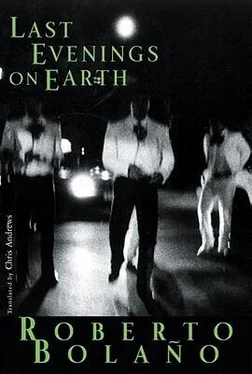The Mexican woman (who was forthright to a fault) thought it was a shame he had given up; she made him tell the story of the magazine in which my poems hadn't appeared, and in the end she judged the arguments that Enrique had marshalled in defense of his renunciation to be sound and sensible, but predicted that before too long he would be writing again with renewed vigor. Enrique's girlfriend agreed with her completely, or almost. Both women seemed to think (although Enrique's girlfriend, for obvious reasons, held this opinion more strongly than mine) that his decision to concentrate on his job — he'd been promoted, which meant he had to travel to Cartagena and Mбlaga for reasons I didn't care to ascertain — and spend his spare time looking after his record collection, his apartment, and his car was far more poetic than wasting his time imitating Leуn Felipe or at best (so to speak) Sanguinetti. I was totally noncommittal when Enrique asked my opinion (as if it might be an irreparable loss for lyric poetry in Spanish or Catalan, for God's sake). I told him I was sure he had made the right decision. He didn't believe me.
That night, or at one of the other four dinners, the conversation turned to children. It was inevitable: poetry and children. I remember (and this I remember with absolute clarity) Enrique confessing that he would like to have a child. The experience of childbirth, those were his words. Not to share it with a woman, no, he wanted it for himself: carrying the child for nine months inside him and then giving birth. I remember, as he said this, I felt a chill in my blood. The two women looked at him tenderly, but I had an intimation, and this was what chilled me, of what would happen years later, and not many years, unfortunately. When the feeling faded — it was brief, just a twinge — Enrique's declaration struck me as a quip, unworthy of reply. Predictably, the others all wanted to have children, and I, predictably, didn't, and in the end, of the four who were present at that dinner, I am the only one who has a child. Life is mysterious as well as vulgar.
It was during the last dinner, when my relationship with the Mexican woman was on the point of exploding, that Enrique told us about a magazine that he contributed to. Here we go, I thought. He corrected himself immediately: That we contribute to. The plural puzzled me momentarily, but then the penny dropped: Enrique and his girlfriend. For once (and for the last time) the Mexican woman and I were in agreement: we asked to see the magazine straight away. It turned out to be one of the numerous periodicals sold at newsstands, with stories on subjects ranging from UFOs to ghosts, and taking in apparitions of the Virgin, little-known pre-Columbian civilizations, and paranormal events in general. It was called Questions Answers, and I think it's still being published. I asked — we asked — how exactly they contributed. Enrique (his girlfriend said practically nothing during this last dinner) explained: on weekends they went to places where there had been sightings of flying saucers; they interviewed the people who had seen them, examined the surroundings, looked for caves (that night Enrique affirmed that many mountains in Catalonia and the rest of Spain were hollow); they stayed up all night, snug in their sleeping bags, with a camera at the ready, sometimes just the two of them, more often in a group of four, five, or six. It was a nice way to spend the night, out in the open, and when it was over, they wrote a report, part of which was published with photos in Questions Answers (so what happened to the rest of it?).
That night, after dinner, I read a couple of the articles that Enrique and his girlfriend had contributed to the magazine. They were badly written, dull, pseudoscientific — the word science, in any case, was used several times — and insufferably arrogant. He wanted to know what I thought of them. I realized that my opinion no longer mattered to him in the least, so, for the first time, I was absolutely frank. I suggested changes; I told him he should learn how to write. I asked him if they had editors at the magazine.
Once we got out of the apartment, the Mexican woman and I burst into uncontrollable laughter. I think it was later that week that we split up. She went to Rome; I stayed on in Barcelona for another year.
For a long time I had no news of Enrique. In fact I think I forgot all about him. I went to live on the outskirts of a village near Girona with five cats and a dog (a bitch, actually). I rarely saw my old friends and acquaintances, although from time to time one of them would drop in and stay with me, never for more than a couple of days. Whoever the visitor happened to be, we would end up talking about friends from Barcelona or Mexico, but I can't remember any of them mentioning Enrique Martin. I only went down to the village once a day, with the dog, to buy food and rummage through my post office box, where I would often find a letter from my sister in Mexico City, which seemed to have changed beyond recognition. The other letters, few and far between, were from South American poets adrift somewhere in South America, with whom I engaged in desultory exchanges, tetchy and melancholic by turns, just like me and my correspondents, coming to the end of youth, coming to accept the end of our dreams.
One day, however, I received a different sort of letter. Actually, it wasn't, strictly speaking, a letter. On the backs of two cards — invitations to a kind of cocktail party thrown by a Barcelona publisher to launch my first novel, a party which I did not attend — someone had sketched a rather rudimentary map, next to which were written the following numbers:
3860 + 429777 -469993? + 51179 -588904 + 966 -39146 + 498207856
Unsurprisingly, this missive was not signed. The anonymous sender had evidently attended the launch. I made no attempt to decipher the numbers, although I guessed it was an eight-word sentence, no doubt dreamt up by one of my friends. There was nothing particularly mysterious about it, except, perhaps, for the sketches. They showed a winding path, a tree beside a house, a river dividing into two, a bridge, a mountain or a hill, a cave. On one side, a simple compass rose indicated north and south. Beside the path, in the opposite direction to the mountain (in the end I decided it must be a mountain) an arrow pointed the way to a village in Ampurdan.
That night, back at my house, while I was preparing dinner, it struck me that it must have been sent by Enrique Martin. I imagined him at the launch, talking with some of my friends (one of whom must have given him the number of my post office box), making scathing remarks about the book, working the room with a glass of wine in his hand, saying hello to everyone, loudly inquiring whether or not I would put in an appearance. I think I felt something like contempt. I think I remembered my exclusion from White Rope, which was ancient history by then.
A week later I received another anonymous letter. Again it was written on one of the invitations to my book launch (he must have picked up several), but this time I noticed some differences. Under my name he had written out a line by Miguel Hernбndez, about happiness and work. And on the other side, the same numbers and a map, radically different from the first one. At first I thought it was just scribble: tangled, intersecting, broken, dotted lines, exclamation marks, drawings rubbed out and superimposed. Finally, after scrutinizing it for the umpteenth time and comparing it with the first cards, I cottoned on: the new map was a continuation of the first one; it was a map of the cave.
I remember thinking we were too old for this sort of joke. One afternoon I leafed through an issue of Questions Answers at a newsstand. I didn't see Enrique's name among the contributors. After a few days I forgot all about him and his letters.
Читать дальше












